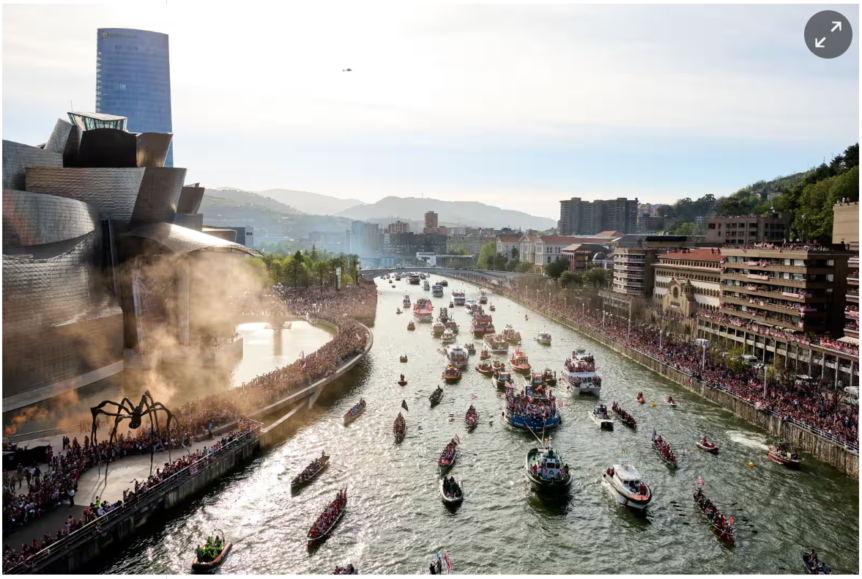
Blog # 19: Basque in the glory: why staying true to your authentic self pays off
On the 6th of April this year, tens of thousands of Athletic Bilbao football club fans packed the streets of the Basque Country.
The club’s red, white and black scarves, flags and jerseys waved from windows, stadiums, streets and cars as what seemed like the entire population of the small nation came to a halt to celebrate their football club’s victory.

Image courtesy of https://www.theguardian.com/football/2024/apr/15/athletic-club-copa-del-rey-celebrations-villarreal-var
And rightfully so; after a whopping 40 years of trying, Athletic Bilbao had finally won the Copa del Rey trophy.
“That’s very nice, Anna, but I’m here to read about destination marketing, thanks, so if you could just…”
I hear you. And a football team winning a cup wouldn’t normally fall under my professional area of interest. But this one does. Because Athletic Bilbao, based in the Basque region spanning the border between France and Spain, only ever allows born and bred Basque people to join the club.
Zero exceptions.
Even if this rule has meant that they hadn’t won a single Copa del Rey since 1984.
While the club has received some serious criticism for this stance – taken way back in the early 1900s – I think it’s something pretty special.
My introduction to the Basque Country
While at university I was working in a hotel in the south of England in the late nineties when I met Aitor. Aitor was one of just over two million native Basques, and though the nation is incredibly small, their pride is enormous. He, like many other Basques, loved football, to the point that he’d wake up and sing the Athletic Bilbao anthem. Every. Morning.
Aitor wasn’t the only ultra-patriotic Basque person; as a people they are loud and proud of their culture. Their local music, food, and sports are totally unique to their small part of the world, and they have, in almost every way, rejected outside influences.
Being Basque
Their language, which they call Euskara, is nothing like the Spanish or French spoken around them. For years they were forbidden to speak it or celebrate their culture, so now it’s fiercely protected.
Their culture is celebrated in festivals like Aste Nagusia (Big Week) where in mid-August Bilbao pulses with parties, fireworks shows, traditional sports tournaments, food fairs and free activities for locals and visitors alike.
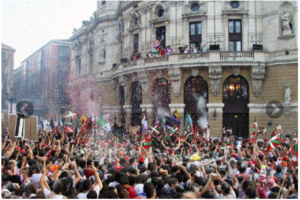
Image courtesy of https://www.euskoguide.com/festivals-events/bilbao-aste-nagusia-semana-grande/
Jai Alai, or Basque Pelota, is a hugely popular sport in the region and the fastest ball sport in the world. Watching a match is an exhilarating, if whiplash-inducing experience!
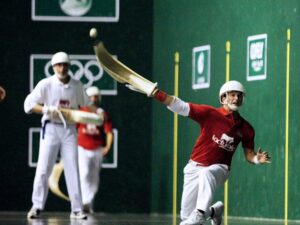
The Basque food and drink is delictable, and it truly makes use of local, traditional ingredients like fresh fish, tomatoes, locally-reared meat, and beautiful fruits and vegetables. Of course, they like to do things differently, so even having a glass of cider to unwind is an affair; drinkers need to catch the cider from a keg that shoots the drink out of a spout.
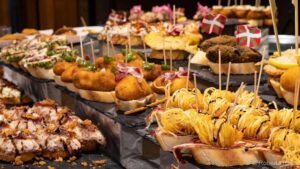
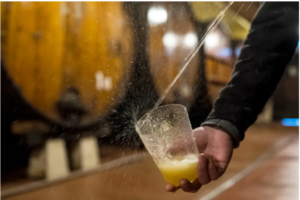
Image courtesy of https://www.nytimes.com/2018/03/16/travel/basque-cider-astigarraga-txotx.html#:~:text=You’re%20supposed%20to%20stand,cidermaker%20to%20the%20next%20barrel.
Being unique isn’t always easy
However, Basque’s determination to maintain its unique identity has not always been a productive stance. As mentioned, their football team went a full four decades without a win. And Aitor and his friends were in the UK for work because the Basque economy in the late nineties meant that jobs were hard to come by.
Despite this, the stance certainly inspires me. They are a people so staunchly authentic that no matter the cost, they remain true to themselves. I will never forget the intense impact their culture had on me on my first visit back in the nineties.
In my work in Destination Marketing, I am always looking for the heartbeat, the truth of a city so I can help develop its story and tell that story to the world.
Many cities I work with reinvent themselves with the trend cycle in an attempt to attract interest, but when they allow their identity to float, their attempts fail. They’ve got no unique offering.
It’s places like the Basque country whose story leaps off the page and grabs you by the hand. They are so unique, so authentically, proudly them that others can’t help but be intrigued. And once we’ve got people intrigued, we’ve got them taking the first steps towards falling in love with a destination and bringing their families, business and money along to check it out.
The payoff
In 1997, Bilbao, the largest city in Basque country, became the site of one of only two Guggenheim Museums. It was a great attraction for tourists to the region, in no small part thanks to the way it celebrated Basque culture. Its architecture reflects Bilbao’s industrial heritage but also represents a new era of the city and region, which has, over the years, transformed into a hub of sustainability and innovation.
This transformation would not have been possible without the inclusion of Basque people themselves. They are the custodians of a culture, industry and identity that makes the Basque country so truly unique and truly attractive.
The Basque country doesn’t tell its story in a flashy way. Instead, it whispers throughout the people, in the markets, through the chinking wine glasses, on the sports field. Every person is an ambassador for their home, and as a destination marketing professional, it’s our job to tap into this resource and amplify it.
As DMOs it can feel challenging to work for a place that might seem resistant to change, or with an identity that is hard to understand as an outsider. But I urge you to do the digging! Go beyond the usual, official sources and instead head to the streets, the coffee shops, the local bars, hardware stores and hangouts. Because it’s here that the true custodians of a city’s story is, and here that the heart of a destination lies. It’s our job to tell that story respectfully, and thus attract the visitors and business that will help boost the destination and visitors at the same time. It’s a win win.
Hopefully, though, it won’t take us forty years to celebrate!

